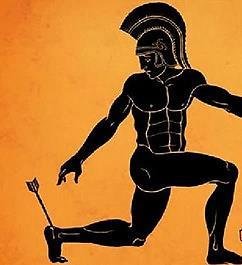
According to Greek mythology, the seemingly invincible warrior Achilles was saddled with the original Achilles heel.
His mother Thetis, in an effort to endow her infant with immortality, had dipped him into the river Styx.
Unfortunately, his left heel never made it into the water. That’s the place where she had been holding him. Having one small point of vulnerability seemed like a minor issue – until the Trojan War, that is, when the Trojan prince Paris, seeking vengeance for the death of his brother at the hands of the Greek hero, shot an arrow that hit just the right spot and brought Achilles down.
Since ancient times, an “Achilles heel” has referred to the point of weakness of an individual, an idea, an enterprise, or even a nation – not to mention the fatal vulnerability of a religion.
For centuries, the so-called problem of evil – “How can an-all powerful, all-good God allow so much suffering in the world?” – has been regarded as the place where Christianity is most vulnerable to attack. But in his book Fool’s Talk: Recovering the Art of Christian Persuasion, Os Guinness proposes that the Achilles heel for most followers of Jesus – at least when it comes to relating to others – is their hypocrisy.
To put it bluntly, Christians regularly and even outrageously fail to practice what they preach.
This is not a new development. During the waning days of the Roman Empire, the emperor Flavius Claudius Julianus (known to history as Julian the Apostate) endeavored to return Rome to the paganism of his ancestors. Julian knew that throwing Christians to the lions had backfired – persecution had actually stimulated the growth of the early church.
Julian, however, whom many historians believe had a Christian upbringing, knew his opponents well. He would destroy them by exploiting their hypocrisy in representing the Prince of Peace.
The emperor called a special meeting of the bishops. He urged them to work through their differences and live together in harmony – knowing that would almost certainly trigger their worst impulses. “No wild beasts are as dangerous to man as Christians are to each other,” he declared. As Guinness points out, “When Christians fight with Christians, there is an important sense in which both are defeated already.”
Julian’s pagan revival ended dramatically when he died after only two years on the throne in A.D. 363. But scores of other historical figures – friends and foes of the church alike – have followed in his footsteps, repudiating Christians for their failure to walk their own talk.
“Christianity might be a good thing, if anyone ever tried it.” (Playwright George Bernard Shaw)
“For God’s sake, don’t touch the Church of England. It’s the only thing that stands between us and Christianity!” (Philosopher C.E.M. Joad, who ultimately became a Christian)
“I believe in the Holy Catholic Church, and I only regret it does not exist.” (Archbishop William Temple)
“If Christians would seem to me to be more saved than they are I might believe in their Savior.” (“God is Dead” philosopher Friedrich Nietzsche)
“The world is filled with half-unbelieving believers and with half-believing unbelievers.” (Theologian Reinhold Niebuhr)
In his book The Portable Atheist, Christopher Hitchens calls attention to the historic failures of Christianity. Instead of documenting a glorious atheistic vision for the world – as Guinness points out, there is no such vision – Hitchens zeroes in on the Crusades, the Inquisition, and witch-burning. Christians, in other words, turn out to be their own worst advertisements.
These observations, because we know they are valid, sting like an arrow that has found its mark.
But that doesn’t mean our spiritual failings have to be our Achilles heel, let alone the grounds that others might use to dodge their own honest search for God.
Christians are not the only hypocrites in the world. It’s safe to say that inconsistency in keeping promises and living up to one’s highest personal ideals is a universal human experience – and a powerful confirmation that the biblical notion of pervasive sin is rooted in reality.
As Jesus’ Parable of the Sower makes clear, only one out of the four kinds of “heart soil” yields a healthy spiritual harvest. Christ himself, in other words, predicted the failure of most people who call themselves Christians.
But that hardly lets us off the hook. Jesus didn’t say, “You know, you should try really hard to be the light of the world and the salt of the earth.” In the Sermon on the Mount he declares, “You are the light of the world and the salt of the earth.” (Matthew 5:13-15)
That’s not just our goal, but our identity. We are Christ’s witnesses, called to provide an authentic and factual account of his work in our lives.
“Let your light shine before others, that they may see your good deeds and glorify your Father in heaven.” (Matthew 5:16)
You would think that after two millennia of the church’s less-than-perfect performance in that quest, the world would have turned its back on Jesus. But just the opposite appears to be true. Spiritual inquirers seem more curious about his life and famished for his message than ever.
Outsiders may look at Jesus’ followers and sigh, “Well, I don’t necessarily want to end up looking like them. But I do want to learn more about Jesus.”
May God give us the grace we need to close the gap between what we say and what we do – so his Light can come shining through.
